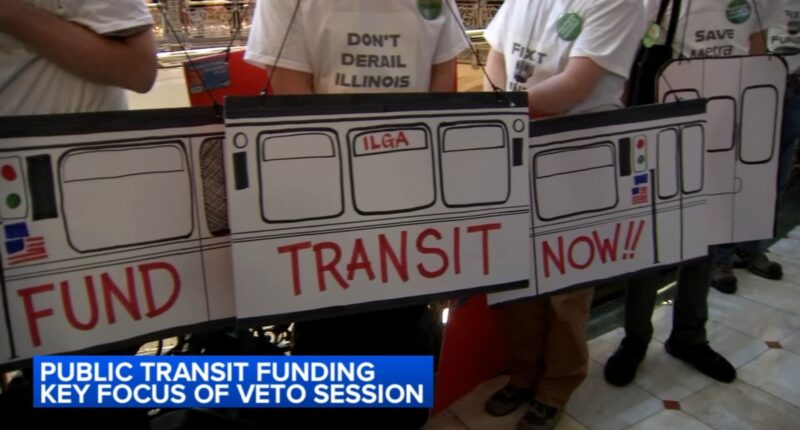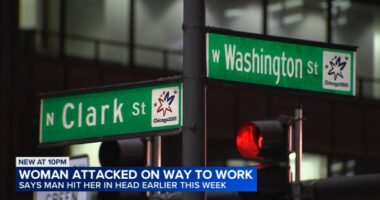Share this @internewscast.com
In Springfield, Illinois, a delegation of Chicago aldermen convened on Tuesday to advocate for Mayor Brandon Johnson’s agenda, which he describes as “progressive revenue.” Their visit aimed to spotlight the impending financial challenges facing mass transit systems.
The aldermen lent their support to the mayor’s initiatives, which include proposals for increasing corporate taxes, introducing a new digital advertisement tax, and revising the rates for personal property replacement taxes.
ABC7 Chicago is now streaming 24/7. Click here to watch
Despite their efforts, these initiatives are unlikely to impact the budget for the upcoming year.
Governor JB Pritzker recently expressed his opposition to the implementation of a head tax.
Additionally, both Chicago business leaders and some aldermen have criticized the head tax proposal, arguing it could be detrimental to job creation.
Chicago business leaders and aldermen have also pushed back on the head tax proposal, saying it’s a job killer.
Mayor Johnson touted the head tax as a corporate investment in public safety.
The city is facing a nearly $1.2 billion shortfall in 2026.
Johnson doubled down Tuesday, calling on big corporations in Chicago to do some soul-searching.
“The best way we do it is that we invest in people and asking our corporate partners to put a little bit more skin in the game so that we don’t continue to balance budgets off the backs of working people,” Johnson said.
During a press conference, the mayor continued his campaign to reinstate a $21-per-employee tax on larger businesses
“I don’t see where he’s going to get the 26 votes in order to pass this budget that has a head tax,” 36th Ward Ald. Gilbert Villegas said.
The mayor’s argument is corporations should help pay for a continued reduction of crime and for consequences of President Donald Trump’s cuts to health care and SNAP benefits.
“Without health care, people will die. They will. And without access to food, more children, we would have been hungry,” Johnson said.
Villegas says the mayor must consider breaking two campaign promises: cuts and raising property taxes.
“The two levers that you have in order to neutralize a budget are reductions in right-sizing government and also creating revenue,” Villegas said.
“For so long, we have constantly asked working people to accept less. That’s not what my ask is in this moment,” Johnson said.
At this point, the mayor has no plans to call on the unions to negotiate cuts or furloughs. Property tax hikes are unlikely, as well as any additional help from Springfield. A balanced budget must pass by the end of the year.
Transit funding bill moving along
State lawmakers are now on track to take up a transit bill to avoid a fiscal cliff that is looming next year.
Movement on a funding bill stalled during the spring session, but the House is now considering legislation that could get passed this week.
Lawmakers are feeling the urgency to get a transit bill passed during the final three days of the veto session to avoid massive service cuts and layoffs to the CTA as well as Metra and Pace.
The House now has a draft bill in hand that leaders hope they can merge with one that the Illinois Senate passed back in the spring.
“And so a lot of what we spent our time on this summer was, how do we get to a package that doesn’t pick winners and losers, that doesn’t overburden people, doesn’t overburden any industries and find a way to move forward?” state Rep. Kam Buckner said. “We were very smart and balanced and methodical. And once again, we’re not picking winners and losers. There is no overburdened industry. People are not going to be hamstrung with this debt.”
A retail delivery tax to fund transit appears to be off the table, but Republicans are concerned about the still-to-be-shared details.
“We’re hearing that possibly the RTA sales tax would have an increase. That’s already an existing tax. And then also there would be an additional charge for the tollway. So that would be an increase, and we’ve heard that could be up to $1.50,” House Republican Leader state Rep. Tony McCombie said.
A contingent of alders along with leading members of Mayor Johnson’s administration met with the House speaker and Senate president.
“Things that we want to look at, the state needs to look at as well, talking about moving the economy from 1940 to 2040. So again, the things that we’re looking at around the digital economy and transit, all those things will have great benefit to the city,” Budget Committee Chair Ald. Jason Ervin said.
“Nothing happens overnight, and it is all about relationships. And it is all about having an ongoing conversation and working together,” Mayor Johnson Chief of Staff Cristina Pacione-Zayas said.
Public transit advocates are also lobbying lawmakers to pass a funding bill because of the alternative if action gets delayed.
“We will start seeing hiring freezes in the first quarter of 2026, all the way leading to service cuts by the middle of next year, if we don’t fix this now. So we really can’t wait till spring legislative session,” said Audrey Wennink, with the Metropolitan Planning Council.
“I’m confident that what the House files will be a bill that the Senate can very quickly get behind,” Buckner said.
The veto session runs through Thursday, and there are a number of other bills on the agenda.
Leaders would like to get the transit bill done by Wednesday, but it’s not clear if things can happen that quickly.

















